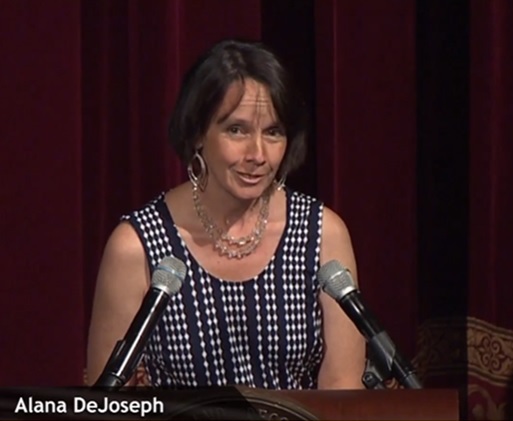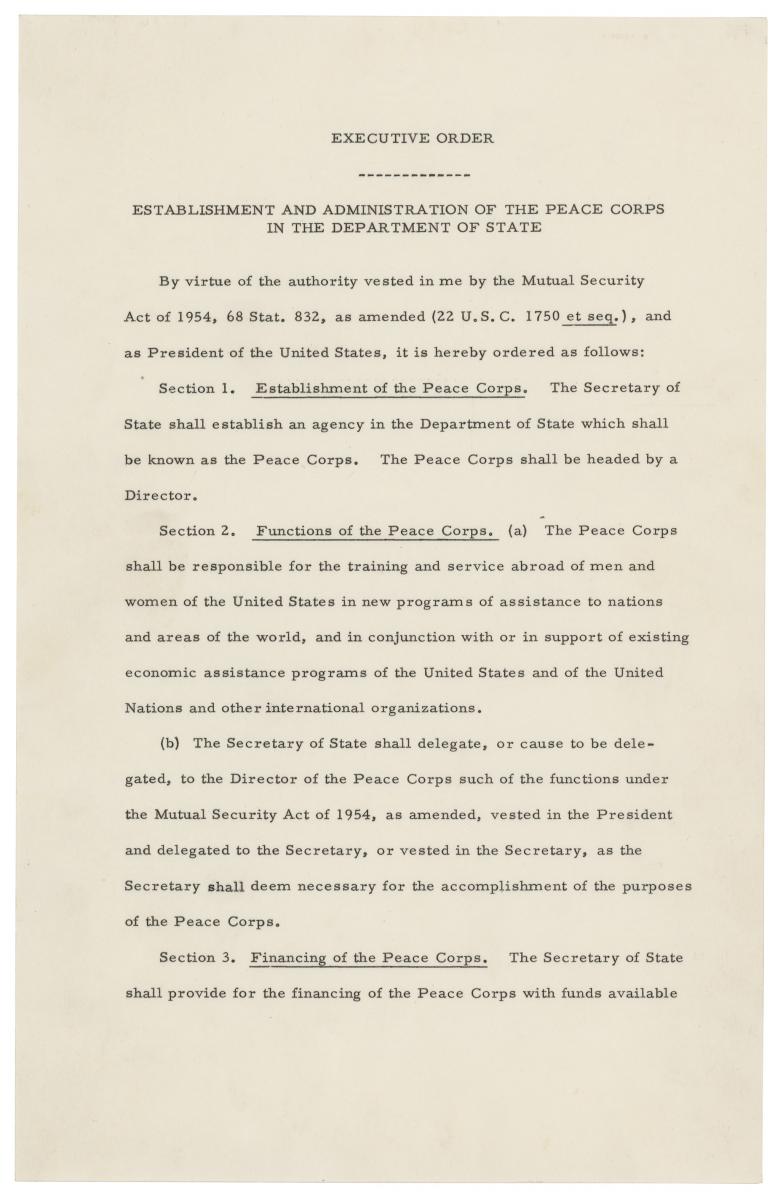
Film Screening at National Archives Honors Peace Corps’s ‘Towering Task’
By Jonathan Marker | National Archives News
WASHINGTON, October 2, 2019 — Peace Corps volunteers have toiled around the globe for more than half a century, often under demanding conditions, to help make the world a better place. With over 200,000 Peace Corps volunteers returned from service since the organization was founded by President John F. Kennedy in 1961, there are countless stories of service and sacrifice that have gone untold and unheard. In a special screening at the National Archives of A Towering Task: The Story of the Peace Corps on September 25, director Alana DeJoseph and screenwriter Shana Kelly brought just a fraction of those stories to life.
 A Towering Task explored the many facets of the Peace Corps’s 60-year history, from the signing of Executive Order 10924 on March 1, 1961, through the organization’s growing pains and struggle for relevancy in the Cold War, to contemporary volunteers working overseas to promote global unity. To tell this story, DeJoseph and Kelly performed extensive archival research at the National Archives. The team also interviewed historians, journalists, former Peace Corps staff and volunteers, and host country nationals to talk about the enormous challenge of building peace.
A Towering Task explored the many facets of the Peace Corps’s 60-year history, from the signing of Executive Order 10924 on March 1, 1961, through the organization’s growing pains and struggle for relevancy in the Cold War, to contemporary volunteers working overseas to promote global unity. To tell this story, DeJoseph and Kelly performed extensive archival research at the National Archives. The team also interviewed historians, journalists, former Peace Corps staff and volunteers, and host country nationals to talk about the enormous challenge of building peace.
“The documentation of the creation of the Peace Corps and the signed Executive order are in the holdings of the National Archives,” said Archivist of the United States David S. Ferriero in welcoming remarks. “We're well aware of the richness of the material in our care, and we're especially pleased and proud when researchers make use of them in ways that make them known to a greater audience. A Towering Task incorporates motion picture footage and still photographs from the National Archives, and we look forward to seeing the results of the filmmakers' work tonight.”
Guest speaker Glenn Blumhorst, president and CEO of the National Peace Corps Association—and a Returned Peace Corps Volunteer who served in Guatemala from 1988 to 1991—offered additional remarks on the cooperation between his organization and A Towering Task filmmakers.
“We help bring the world home through our Peace Corps experience, and that experience is so important now as we share with others around us here in the United States and around the world the importance of cross-cultural friendships, and building bridges across cultures and across those visions that sometimes separate us,” Blumhorst said. “So I hope, and I trust, and I know that in the future, this film will serve that purpose. It is going to enable our community to engage with others who may not even know that the Peace Corps still exists. This film is going to serve a useful purpose of raising the flag of the Peace Corps high above our country.”
Before the screening, Alana DeJoseph, producer/director of A Towering Task and a Returned Peace Corps Volunteer in Mali, thanked the National Archives not only for hosting the special screening but also for accommodating the production team with access to archival records. “This has been a home for all of our archival research, and the kindness, and the diligence, and the passion with which we were supported in finding our archival materials was stunning.”
Following the screening, DeJoseph and producer/screenwriter Shana Kelly took questions from the audience. Kelly, whom DeJoseph described as the “real rock star” in the film’s production, answered the first question from a Peace Corps Volunteer who served in Togo from 2014 to 2016. They asked, "With so much archival material that you had to go through, what was right on the brink there that you had to cut?"
“Well, there was so much [to process],” Kelly said. “The archival footage just brought everything to life for us, and we tried to include as much of what was really key to the story.”
“Especially for the sixties,” DeJoseph interjected, “because it was so hard to be able to tell the whole story of the Peace Corps, coming all the way to contemporary times without spending the first three-quarters of the film on the sixties. There were so many clips we wanted to include, so it was heartbreaking not to include those really cool clips.”
Another audience member asked about plans for distributing the film.
“Over the course of the next year,” DeJoseph said, “we have a goal of 1,000 community screenings across the U.S. and at least one screening in every one of the 141 Peace Corps countries. That’s ambitious, but it’s doable. Several years ago, we did a Forest Service documentary, and we did over 1,000 screenings over the course of a year.”
Find out about upcoming events in the National Archives online calendar.
